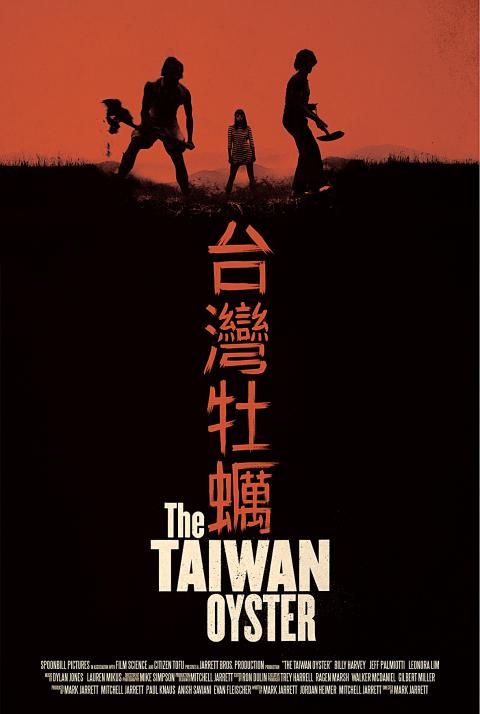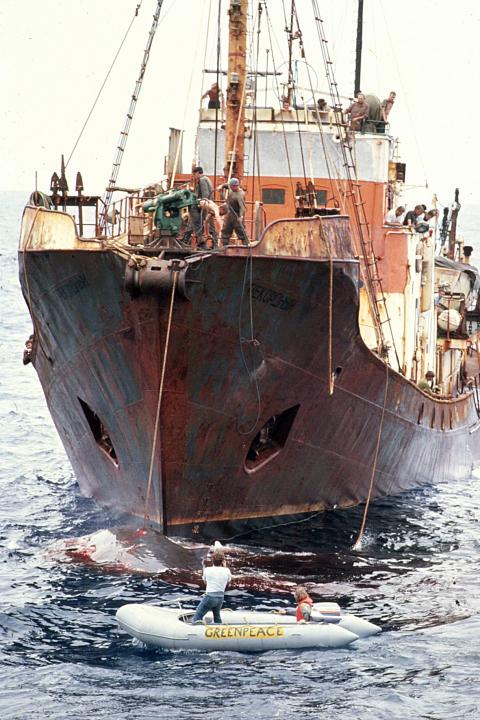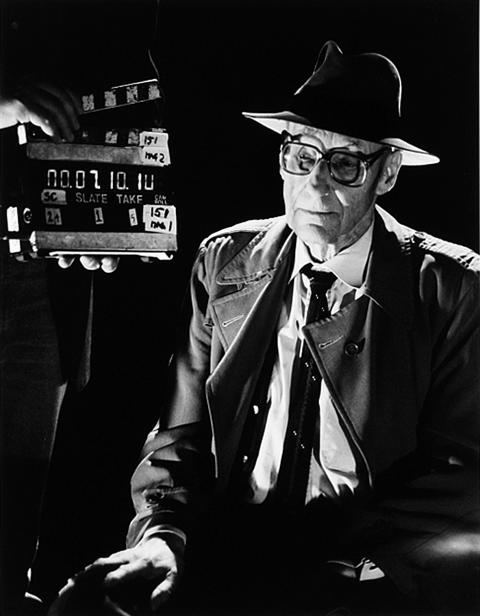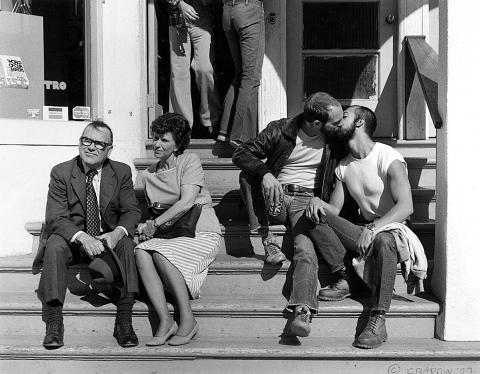Over the past decade, the Urban Nomad Film Festival has brought some of the most exciting and thought-provoking indie films from around the world to Taipei. Now in its 11th edition, the event runs from Thursday to April 22 at Huashan 1914 Creative Park (華山1914). Films will cover topics ranging from writer William S. Burroughs to Filipino exploitation movies.
Though this year’s theme is ostensibly art and technology, Urban Nomad founders David Frazier and Sean Scanlan seek a broad range of submissions every year. Since launching in 2002, Urban Nomad has cultivated a youthful audience filled with socially aware, culturally savvy viewers.
Culture, technology and activism “are the three really big areas that are happening in terms of documentary right now,” says Frazier. “We’ve found a really awesome audience for these films in Taiwan. I don’t know if it was so obvious before we started showing these kinds of movies.”

Photo courtesy of Urban Nomad
This year’s festival starts on Thursday next week with The Taiwan Oyster, a US feature-length drama directed by Mark Jarrett, who lived in Taichung from 1999 to 2001. Two expat English teachers steal the body of a coworker after he dies in an accident and travel with it across Taiwan, determined to give their former colleague a proper burial and make it to Spring Scream on time.
“It is the first film that talks about what it is like to be an English teacher here, what it is like to consider life and death, and the reality of making your home in a foreign country. And it is totally about Taiwan,” says Frazier.
“If you look at Taiwanese cinema, it is all very much in the eyes of the Taiwanese. So to see a foreign director come here and produce a different interpretation of this country is very interesting and also needed,” he adds.

Photo courtesy of Urban Nomad
Singaporean director Tan Siok Siok’s (陳惜惜) Twittamentary, which screens on April 22, offers viewers an interactive experience. The film originated as a crowd-sourcing experiment in which Twitter users were invited to contribute story ideas, videos and other media. Tan then took a road trip across the US to interview users of the microblogging platform, including a homeless woman, a prostitute who uses Twitter as a personal “GPS” and Huffington Post founder Arianna Huffington. The film will be shown in dual screen mode with a “live” Twitter wall that users can contribute to using the hashtag #twittamentary.
Other films in this year’s lineup include Morgan Spurlock’s latest documentary The Greatest Movie Ever Sold, which tackles the ubiquity of product placement, marketing and advertising in US culture.
Recommended to Frazier by an Urban Nomad audience member, Kinshasa Symphony is about Central Africa’s only symphony orchestra, based in the capital of the Democratic Republic of Congo. The German documentary, which will be shown on April 22, follows the lives of the musicians, many of whom are self-taught, as they live among the 10 million inhabitants of one of the world’s poorest cities. Directed by Claus Wischmann and Martin Baer, Kinshasa Symphony has already won more than 15 awards at film festivals across the world.

Photo courtesy of Urban Nomad
Australian director Mark Hartley pays tribute to Filipino genre movies of the 1970s and 1980s in Machete Maidens Unleashed! Cheap labor, exotic scenery and non-existent health and safety regulations created an anything-goes environment for exploitation filmmakers, including cult movie icons like Roger Corman, Joe Dante, John Landis, Sid Haig and Eddie Romero, all of whom are featured in interviews in the film. Machete Maidens Unleashed! screens on April 16 and April 21.
Other festival movies focus on art and culture, including Lemmy, a 2010 documentary about Motorhead frontman Lemmy Kilmister, Jean Michel Basquiat: The Radiant Child, William S. Burroughs: A Man Within, Everyday Sunshine: The Story of Fishbone and PressPausePlay, a Swedish film that asks if the digital democratization of culture has really resulted in better art, film, music and literature.
Viewers interested in activism and social justice may find the following films noteworthy: If a Tree Falls, a 2012 Oscar nominee for best documentary that examines the fringe of American’s environmental movement; We Were Here, about the onset of the HIV/AIDS crisis in San Francisco’s gay community and how it helped turn the fight for gay rights into a bona fide political movement; GrowthBusters, in which director and activist Dave Gardner argues that urban growth and uncontrolled development in the US has led to a lower standard of living for Americans; and the 2011 French documentary Greenpeace: The Story.

Photo courtesy of Urban Nomad
This year, viewers can enjoy Urban Nomad’s short film happy hour for free with a ticket to any 7pm screening (regular admission is NT$50). While the festival’s short film segment provides up-and-coming filmmakers with an invaluable platform, it also allows established directors and producers to showcase independent projects.
Chuang Ching-shen (莊景燊), the director of popular Taiwanese documentary Jump! Boys (翻滾吧!男孩), teamed up with legendary producer Wang Tung (王童) to create Reflection (美麗鏡界). In the movie, actress Chamder Tsai (蔡燦得) portrays a woman divided between her job as a caretaker for three boys with learning difficulties and a life of comfort with her husband. Another notable entry is Time of Cherry Blossoms (櫻時), a gorgeous anime film that Frazier compares to Spirited Away. In the animation, a young boy has a phantasmagorical encounter with an array of deities after wondering into a dilapidated temple in the Taiwanese countryside.
Short films screen on April 13 and from April 16 to April 20 starting at 6pm every night, before the feature-length films. For a complete short film schedule and descriptions, visit urbannomaden.blogspot.com/p/short-film-info.html

Taiwan has next to no political engagement in Myanmar, either with the ruling military junta nor the dozens of armed groups who’ve in the last five years taken over around two-thirds of the nation’s territory in a sprawling, patchwork civil war. But early last month, the leader of one relatively minor Burmese revolutionary faction, General Nerdah Bomya, who is also an alleged war criminal, made a low key visit to Taipei, where he met with a member of President William Lai’s (賴清德) staff, a retired Taiwanese military official and several academics. “I feel like Taiwan is a good example of

March 2 to March 8 Gunfire rang out along the shore of the frontline island of Lieyu (烈嶼) on a foggy afternoon on March 7, 1987. By the time it was over, about 20 unarmed Vietnamese refugees — men, women, elderly and children — were dead. They were hastily buried, followed by decades of silence. Months later, opposition politicians and journalists tried to uncover what had happened, but conflicting accounts only deepened the confusion. One version suggested that government troops had mistakenly killed their own operatives attempting to return home from Vietnam. The military maintained that the

Before the last section of the round-the-island railway was electrified, one old blue train still chugged back and forth between Pingtung County’s Fangliao (枋寮) and Taitung (台東) stations once a day. It was so slow, was so hot (it had no air conditioning) and covered such a short distance, that the low fare still failed to attract many riders. This relic of the past was finally retired when the South Link Line was fully electrified on Dec. 23, 2020. A wave of nostalgia surrounded the termination of the Ordinary Train service, as these train carriages had been in use for decades

Lori Sepich smoked for years and sometimes skipped taking her blood pressure medicine. But she never thought she’d have a heart attack. The possibility “just wasn’t registering with me,” said the 64-year-old from Memphis, Tennessee, who suffered two of them 13 years apart. She’s far from alone. More than 60 million women in the US live with cardiovascular disease, which includes heart disease as well as stroke, heart failure and atrial fibrillation. And despite the myth that heart attacks mostly strike men, women are vulnerable too. Overall in the US, 1 in 5 women dies of cardiovascular disease each year, 37,000 of them